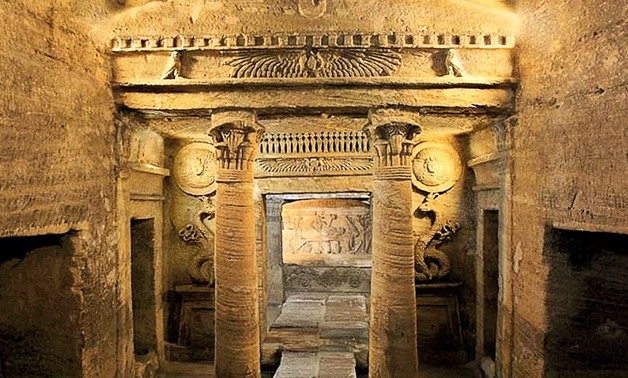https://www.egypttoday.com/Article/9/45153/Alexandrian-catacombs-A-look-into-Hellenistic-past
 The Catacombs of Kom el-Shoqafa on Feb. 24, 2016 – CC via Wikimedia Commons/Asiatologist
The Catacombs of Kom el-Shoqafa on Feb. 24, 2016 – CC via Wikimedia Commons/Asiatologist Alexandrian catacombs: A look into Hellenistic past
Fri, Mar. 16, 2018
CAIRO – 16 March 2018: Luxor and Aswan are known for ancient Egyptians tombs and temples, some of which are almost as colorful as they once were. However, Egypt's north, Alexandria to be exact, also has a share of the glory, although its monuments are rather low-profile, even among Egyptians.

Pillars inside the catacombs – Photo courtesy of Ancient history Facebook page
The Catacombs of Kom el-Shoqafa offers a detailed look into the metropolitan the past of the ancient Egyptians, Greeks and Romans. They were one of the Seven Wonders of the Middle Ages.

Sarcophagus showing Egyptian god and priests offering sacrifices is seen in the photo taken on April 4, 2007 – CC via Wikimedia Commons/Jerrye & Roy Klotz, MD
The necropolis, dating back to the second century AD and expanding through the third and fourth centuries, contains statues and archaeological objects attributed to the Hellenistic era and the early Roman period in Egypt. It was rediscovered in 1900 after a donkey fell into the entrance shaft, although excavation work in the area had begun in 1892.

Funerary art in the catacombs - Photo courtesy of Ancient history Facebook page
Kom el-Shoqafa, meaning the Mound of Shards in Arabic, was named so because it was covered with broken jars and pots made of clay that were left by people who visited the tombs.

Frescoes in Tigrane Tomb, Catacombs kom El-Shoqafa seen in a photo taken on Sept. 4, 2017 – CC via Wikimedia Commons/Ibrahim el-Mezayen
Bearded snakes, flying sun disks, crowns representing Upper Egypt and Lower Egypt, are some of the magnificent art that can be seen deep below the ground. The mixture of ancient Egyptian, Greek and Roman funerary art in the catacombs is manifested in beautiful harmony.

Graves in the catacombs on Sept. 7, 2003 – CC via Wikimedia Commons/Ronald Unger
A ticket into the site costs Egyptians LE 35, while Egyptian students are only asked to pay LE 20, according to the Egypt Tourism Authority website. The place is open from 9 a.m. to 5 p.m.

Pillars inside the catacombs – Photo courtesy of Ancient history Facebook page
The Catacombs of Kom el-Shoqafa offers a detailed look into the metropolitan the past of the ancient Egyptians, Greeks and Romans. They were one of the Seven Wonders of the Middle Ages.

Sarcophagus showing Egyptian god and priests offering sacrifices is seen in the photo taken on April 4, 2007 – CC via Wikimedia Commons/Jerrye & Roy Klotz, MD
The necropolis, dating back to the second century AD and expanding through the third and fourth centuries, contains statues and archaeological objects attributed to the Hellenistic era and the early Roman period in Egypt. It was rediscovered in 1900 after a donkey fell into the entrance shaft, although excavation work in the area had begun in 1892.

Funerary art in the catacombs - Photo courtesy of Ancient history Facebook page
Kom el-Shoqafa, meaning the Mound of Shards in Arabic, was named so because it was covered with broken jars and pots made of clay that were left by people who visited the tombs.

Frescoes in Tigrane Tomb, Catacombs kom El-Shoqafa seen in a photo taken on Sept. 4, 2017 – CC via Wikimedia Commons/Ibrahim el-Mezayen
Bearded snakes, flying sun disks, crowns representing Upper Egypt and Lower Egypt, are some of the magnificent art that can be seen deep below the ground. The mixture of ancient Egyptian, Greek and Roman funerary art in the catacombs is manifested in beautiful harmony.

Graves in the catacombs on Sept. 7, 2003 – CC via Wikimedia Commons/Ronald Unger
A ticket into the site costs Egyptians LE 35, while Egyptian students are only asked to pay LE 20, according to the Egypt Tourism Authority website. The place is open from 9 a.m. to 5 p.m.
-- Sent from my Linux system.
No comments:
Post a Comment